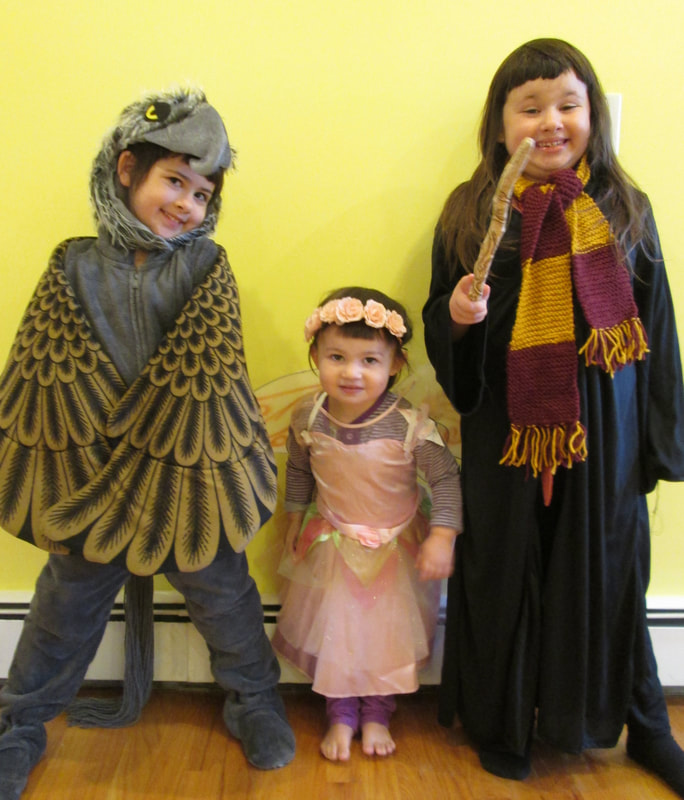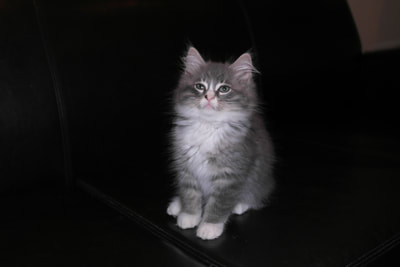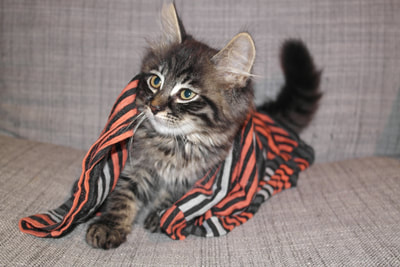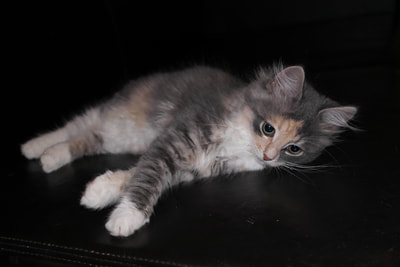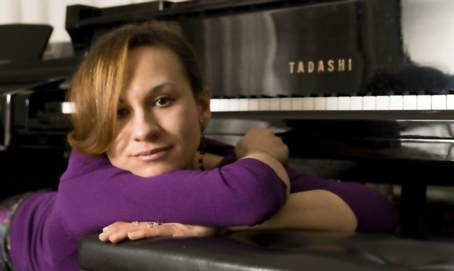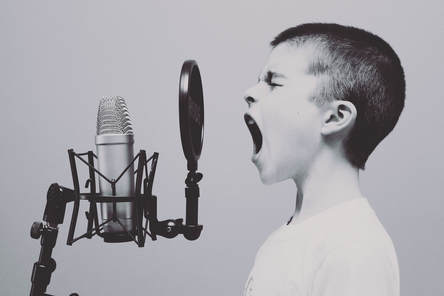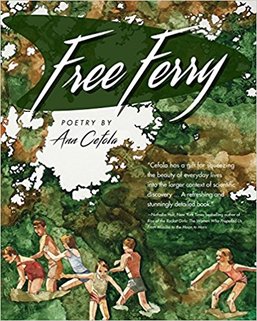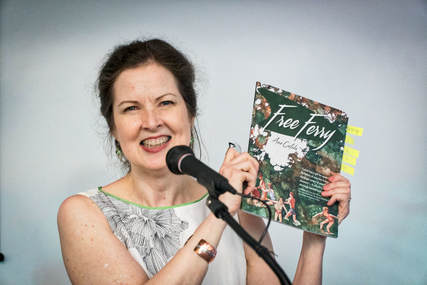 Marina J. Neary is on the Review Board of Bewildering Stories, the same magazine where I am the Book Reviews Editor. Now, it would have been unlikely our paths would have crossed electronically, as we work in completely different sections of the magazine and our sections don't tend to interact. But it turns out that we are "neighbors" in real life - we live a few towns apart in Connecticut. I've also had the pleasure to read and review a couple of her books. Her latest book is Sirens Over the Hudson, a novel that is also local, and takes place in Tarrytown and New York City. My review of it came out today in Bewildering Stories, which you can read here. Marina's books span a large number of topics and time periods, and are always engrossing to read. She has won awards for her work, and is also an accomplished poet, playwright, essayist, journalist, model, actress, dancer and choreographer. She was kind enough to chat with me about her writing process and ideas, good and bad characters, the influence of history on her work, publishing in today's market and, a favorite topic, cats! So, without further ado, let's go straight to the interview. 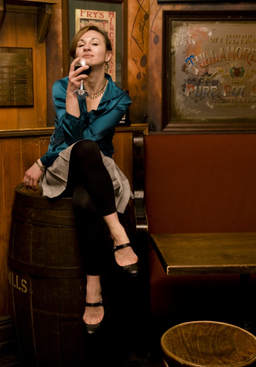 Hello, Marina, and thank you for joining me today! I had the great pleasure to read your recent book, Sirens Over the Hudson, a novel set locally in Connecticut and New York and containing a large and complex cast of characters. We'll chat more about it in a bit, but first--you have a number of novels published, which span a wide variety of subjects. What genres do you write? How did you get started on your writing journey? Thank you for taking the time to talk to a crazy cat lady! Indeed, I have written 11 novels to date. I have put my fat sausage fingers into any genre that allows a tragic, messy, depressing ending. That means hardcore historical (there are very few happy endings in history), Dystopian and social satire. To me, writing is not a journey. To me it's a confinement. A lunatic asylum for one. My own cozy, flannel straight jacket. Your novels certainly have "tragic, messy, depressing endings." When reading your books, I'm often blown away by the level of detail and plot twists. All the characters are complex. There aren't any "good" guys or "bad" guys, but simply shadings of each. What is the writing process behind your books - do you do extensive planning and research beforehand or do you just sit down, tie yourself up in your straight jacket and write? I am very glad that you picked up on the fact that I do not polarize good and bad in my novels. Some of my readers like that, while others complain that I don't give them "a hero to root for". Sorry, but I don't write screenplays for Marvel-based movies. I keep hearing "Your work is so depressing. Life is so hard already. I want some comfort food." Again, sorry, I don't serve literary mac and cheese. There are plenty of authors who do - Maeve Binchy and Nicholas Sparks for starters. I am not forcing anyone to read outside of their comfort zone. I just think it's fair to warn the readers ahead of the game: you will not walk away with a warm and fuzzy feeling after reading my works. My mission is to challenge stereotypes and encourage critical thinking. My recent novels are products of decades - yes, decades - of plotting and pondering. Some of them they started off as a series of sketches in the 1990s when I was a high-school student. As you can imagine, I was a very angry, lonely young woman, who found comfort in heavy metal, Gregorian chant, cigarettes and frankincense. I don't have your typical white bread "girl next door" American upbringing. I come from an ethnically mixed, artistic family. We came to the US as political refugees. So I never really developed a taste for white bread and mac and cheese. It's funny how American claim to be "a land of diversity", yet there is a considerable percentage of the population that adheres to that "white bread / mac & cheese" mentality. On one hand, we are being told "not to judge", and then we are being bombarded with plot lines featuring good guys in capes and bad guys in bad suits. Don't forget bad guys with bad hair, ha ha. Aside from your background and your family, what do you think most informs your writing? For example, who are some of your literary heroes and what inspires you about their work? I love obscure legends and folklore, places off the beaten path, forgotten by God. I love illuminating the lesser known historical figures. For instance, I have a series of novels set in Ireland during the Easter Rising. Instead of focusing on the iconic figures, I focus on those who were neglected by historians - accidentally or deliberately. I'm a huge fan of Fitzgerald, Hemingway and Irving, so in a way Sirens Over the Hudson is my tribute to those three American giants. Spoiler alert: the Headless Horseman makes a cameo in 21st century Tarrytown. Of course, I also use my personal experiences. They say "write what you know". Some of the scenarios and dialogues in the novel are transcribed from real life. And of course, most characters have real life prototypes. I came to the US in the early 1990s and spent my teen years in Connecticut and New York. 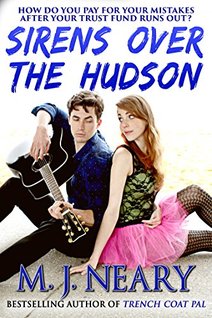 While there are a number of novels set in New York that describe only the shiny surfaces of the town elite or only the underbelly of the city, I feel that Sirens Over the Hudson takes a different tack. It examines the interaction of these two elements, surface and underneath. It examines borders, boundaries, and how to break through them. I also noticed this theme in other works of yours, where the characters act as bridges between political, religious and socioeconomic worlds. How do you think this theme of fluidity resonates with today's reader in the current national and international climate, especially when many of the events of this particular novel are set in the not-too-distant past? Again, people are going to get offended and say that "this is no laughing matter", but I believe that both sides, the red and the blue, need a little bit of humor. Having been an outsider and an outcast my whole life, I've learned to laugh at myself, my reflection, my beliefs. Maybe it's my Judeo-Slavic heritage. To me very few things are sacred. Even though I voted for Trump, I'm not above making fun of Republicans. I don't really have a place among humans, so I make fun of them: gay, straight, liberal, conservative, Muslim, Christian, you name it. It's not that I hate people. The problem is that they hate each other and themselves. I am past love or hate. So no humans to love? Maybe... kittens? (And pictures would be a bonus.) :) Sure, there are humans to love. It's just that my kind of love gets rejected. But that's fine. I have the love of God. It seems like an awfully gauche thing to say. I had seriously contemplated becoming a nun when I was a little girl. But then I realized that I would be living side by side with other women, and I just can't fathom bathing in all that estrogen. There are ways to serve God in this world. In addition to my human family and my writing, I have an amazing day in foreign exchange that allows me to utilize my knowledge of foreign languages and cultures. I also support a number of charities in the US and overseas. I also breed Siberian cats. The kittens produced by my stud Rory really make a difference in people's lives. I'm not some sociopath. Every day I try to do things to make the world a little better, brighter, funnier, less confused. Kitty pictures are coming up! Rory's kittens are going to their new moms and dad's. Rory's stud fee is $1600 per litter, so it's a nice chunk of change after 7 litters. And of course, as a breeder, I get a lot of criticism from animal rights activists, who claim that "people like me" reduce the chances for homeless pets to be adopted. People who say that don't understand the pet market. Most people cannot dish out $1600-2000 on a purebred, so if they want a cat or a dog, they will go to a shelter. A purebred kitten is an exclusive specialty item meant for a very specific group of people. And many people who have purebreds also adopt from shelters and support various organizations to benefit animals in need. I agree that's the most any of us can do - try to make the world a bit better by our actions. And it sounds like you are amazingly busy. How do you find time to do everything and also write so much? Do you write when the mood hits or do you have a set schedule when you always write? I plotted many of my novels when my son was little. I had him in my early 20s, and I was very busy establishing myself professionally at the same time. Also, my early drafts generated more ridicule than praise, so it took me more than 10 years to muster the courage to revisit those early drafts and develop them into publishable novels. Some of the novels you see now date back to the 1990s. So the seeds were planted a long time ago. Aha, I definitely know what you're talking about - several of my books have been in the works for a while. 10+ years sounds about right. That gives them enough time to ferment into something palatable. One question that pops up a lot in writers' circles is the question of how to get their work out there, as the industry has been in flux for a number of years due to the expansion of publishing options. Should a writer take the traditional route with an agent and one of the Big Five, go indie press with or without an agent, or self-publish? Each route has its own difficulties and benefits. What publishing plan do you follow, and do you have any advice for aspiring novelists about this dilemma? Yes, sometimes you have to let the books sit and ferment on their own. Sometimes you need to add ingredients and stir the concoction up a little. Your book matures with you. That time frame between 15 and 35 is so rich in sensory, emotional and intellectual experiences for most people. Use those experiences as catalysts for those "embryonic" plots. Indeed, the publishing industry has been in flux. There are so many trends and nuances that affect your chances of succeeding (and we all define success differently). If a Big Five publisher knocks on your door - go with it. Take it. Make reasonable plot concessions. My work is just not for a broad audience. I work with several medium-size publishers. Unless you are published by Random House, you should expect to put in a lot of promotional legwork. You will solicit reviewers and bloggers and send them PDFs of your work. On some days, you will feel like a hooker standing on a street corner, offering free goods. And then you get that one review that makes it all worth it. And it will remind you why you write in the first place. Is there any fun fact about your writing process that most people wouldn't know? For example, I know one writer who only writes between 4-7 in the morning, one writer who takes small day trips for inspiration before beginning a new project, and another writer who can only write when drinking a certain kind of tea. Does everything about your environment have to be exactly right or are you an "open your laptop and run with it" kind of gal? If everything in the environment had to be "right", I never would've written a single sentence (laughing). I write on my lunch hour at work. I write in the middle of the night. I write at 5:30 in the morning. As a mother of three, you know the term "breastfeeding on demand". That's what writing is like for some of us. When your Muse grabs you by the throat - and my Muse is a throat-grabber, not a gentle back-scratcher - I comply. 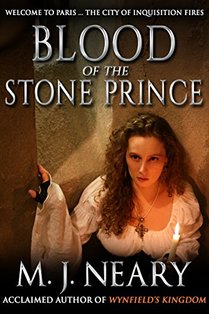 I feel the exact same way. Write when you can, every time you can. Which brings my to my next question - what's on the horizon for you? What are you working on? Do you have any new publications coming out? If you are a writer, you don't have to be in a cottage in the Alps to write. Inspiration strikes in the most unglamorous and uninspiring places (like court rooms, emergency rooms, public bathrooms). Actually, I do have a new novel coming out. Set in 15th century France, it is a medieval hipster novel. Jokes aside. It's a new genre I am trying to develop. All the angst of decadent, artsy urban living - but in a different era. You will recognize many universal archetypes: the sickly goth chick, the drama club geek, the child genius, the sensitive jock, the CEO of a pharmaceutical company. My goal was to create an ensemble cast of recognizable, tangible characters that modern audiences could relate to. The title is Blood of the Stone Prince, and it's coming out very soon. Your new book sounds just as interesting as Sirens Over the Hudson. I love the variety in your writing - I look forward to reading it! Thank you again for joining me, Marina! It's been a pleasure to talk with you. Thank you, my dear! 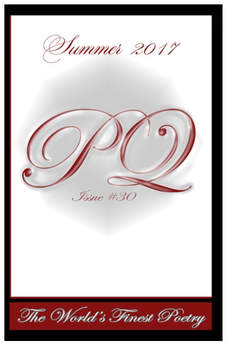 I am proud to say that I come from a very creatively-inclined family. One of my extended cousins is a very talented writer, a couple of my aunts are artists, my grandmothers and mom (and other extended family) did a lot of beautiful handwork, such as tailoring, quilting and knitting. In fact, my dad's mom published her first book when she was 90 years old! Another one of my aunts is a very wonderful choir singer and musician. I remember when we would go visit family in Canada (or family would visit us in California), and she would sing to us and play her flute and guitar. It happens that she's also blind, although that never made a difference to us as children (except for when we cut up one of her braille books because we liked the patterns in it, unfortunately - I'm still sorry about that). And we grew up hearing how our dad, her older brother, would take her on mini adventures when she was very small, such as climbing trees or playing down by the railroad tracks. Each generation, though, seems to get more and more protective of their children. Not a bad thing, but sometimes it seems like we veer too far into overprotective. I sometimes wonder what it would be like to raise a child who had a disability. Would I be overprotective or would I let him/her have the same freedoms, as much as possible, as my other children? I imagine the fear on both sides - me, as a mom, afraid that something would happen to my loved one, and the fear of my child to let him/herself go. My poem "Blindly" comes from this imagining, from looking at this fear head-on and hoping that it would be something we'd both be able to overcome. Although the word "blindly" is used as a nod to my aunt, the poem is more about the fear we face in any situation, both as parents and children, and how that fear can either hold us back... or when strong enough to face that fear, it can give us the freedom to find out who we are. I hope you enjoy reading my poem in Poetry Quarterly. It's just one of many poems by a wonderful group of poets. I love fairy tales. One of my own personal favorites is Beauty and the Beast (check back here for more news about that soon!) but I will take any fairy tale from any culture, and it will set me dreaming. I've reimagined several fairy tales from Japan in both short stories and poems, but I will always turn back to my childhood favorites for inspiration.
"Thumbs" is the result of one of these forays, published recently at the Hugo-nominated magazine Abyss & Apex (my poem happens to be right next to another poem by the amazingly talented writer Jane Yolen, eeee!). I didn't realize when I wrote it, but when I was recently talking to my mom, she mentioned Thumbelina was one of her favorite fairy tales. So this poem's for you, mom. :) When I first decided in 2013 that I was going to focus on getting my stories published again, I started out with some ideas I'd been kicking around for a while. Most of these have been published by now, showing that some ideas can be universal. My most recent publication, "The Soldier's Choice," is something I've had at the back of my head as a good world for a novel-length work. I've never written the book, but this idea has been calling to me for a while now, and I decided to finally put pen to paper. I'm glad I did. It turned out to be a lot of fun to write, and the characters I've been thinking about for over a decade have now finally seen the light of day. Maybe someday I'll write the full novel, but I'm glad to have let Shazia escape from my brain and onto the written page.
The story was published at the end of September at Swords and Sorcery Magazine, and I'm very grateful to editor Curtis Ellet for publishing it. It's in Issue 68, along with a fabulous story by Sam Beaven called "The Thirst of Untus." I hope everyone enjoys reading the issue! I will be venturing out of my writerly cave next week and will be doing a flash fiction reading at a great local Connecticut venue, Best Video, located at 1842 Whitney Ave in Hamden. The reading takes place on lucky Friday the 13th, starting at 7pm. Some other writers participating include Tom Hazuka, April Bradley, Doug Mathewson and Paul Beckman. Please stop by, listen to some great flash fiction, and say hi!
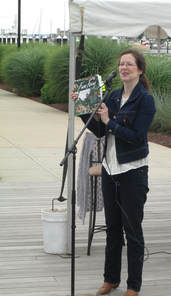 Ann Cefola at the Poet's Corner at the Stamford Arts Festival. Ann Cefola at the Poet's Corner at the Stamford Arts Festival. Over the summer, I did two poetry readings organized by the talented writer Jerry T. Johnson. At the Arts Festival in Stamford, I met fellow poet Ann Cefola. Although we didn't have a lot of time to talk in person, she was quite lovely to chat with, and a very accomplished poet, with several collections of poetry and notable achievements in the field. Her official bio: Ann Cefola is author of Free Ferry, (Upper Hand Press, 2017); Face Painting in the Dark (Dos Madres Press, 2014), St. Agnes, Pink-Slipped (Kattywompus Press, 2011), Sugaring (Dancing Girl Press, 2007), and the translation Hence this cradle (Seismicity Editions, 2007). A Witter Bynner Poetry Translation Residency recipient, she also received the Robert Penn Warren Award judged by John Ashbery. Her work appears in journals such as Feminist Studies and Natural Bridge, and translations in Eleven-Eleven, Exchanges, and Inventory among others. I recently reviewed her latest poetry collection, Free Ferry. The book review will be coming out in November at Bewildering Stories. She was also kind enough to agree to answer a few questions about her work, her writing, and the art of translating poetry from one language to another.
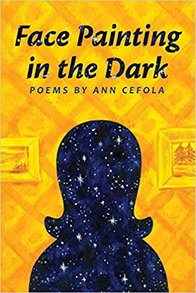 I love the idea of poetry being a language all by itself - and you being fluent in it from an early age. Referring to languages, I also see that you've done a translation of Hélène Sanguinetti's poetry from French to English. While your published poems are in English, have you ever written poetry in a different language or had your poems translated to another language? If so, how does language affect your style? If not, do you think you ever would? Poetry feels an act of translation--so I probably would not attempt to write in another language beyond English. But--funny you should mention--a dear friend, Ligia Yamazaki, is translating my first book, Face Painting the Dark, into Spanish. When I wrote the long poem, "Demoiselles 7," I tapped into the voice and intonation of Ligia, a native Colombian, as I invited the female figures in Picasso's "Demoiselles d'Avignon" to speak. So the poem had a Latin feel to it, but now, in Spanish, it is over-the-top beautiful, like the poem has found its true home. 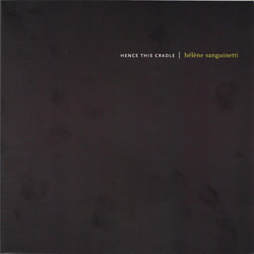 That sounds really lovely, especially being able to work with your friend to bring about your vision of your work. Since you've been on both sides of the equation, what's entailed in translating poetry from one language to another? How closely do you work with your counterpart? The first step is getting the meaning down, and then crafting it to reflect the writer's intention as closely as possible. When I first met Hélène, she said, "Do whatever you want." And I replied, "You can't steal my words--I want to follow yours as closely as possible!" She only protests when I might smooth the sharp edges that make her work so compelling. Although we are in frequent contact about publishers interested in her poetry, I work on my own. As a translator of French poetry, the many references to Greek mythology in Free Ferry, and mention in the previous question of your poem taking on the voice of the Colombian native, Ligia, your work certainly has international themes. I might hazard a guess that you've traveled a fair amount. If you're comfortable doing so, could you tell us a little bit about your background - such as where you grew up, the languages you speak, and maybe where you've enjoyed traveling? 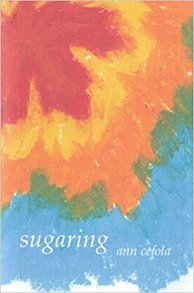 I grew up in the New York suburbs. After studying French and Spanish in college, I found work with French companies. During those years, I traveled to France and Italy. After I started my own communications business, my focus was on my New York area clients--several Fortune 10 companies. Travel took a backseat, and today I would certainly love to catch up on it. A review I did of your book Free Ferry will be coming out at the magazine Bewildering Stories in November. I really enjoyed the dichotomy between childhood and the adult world, between scientific accomplishment and everyday family events. Although there is some thematic overlap, what spurred the ideas between this exploration of concepts that are presented as opposing, to the point that even the poems are separated by the length of the page (the everyday poems are at the top of the page, the scientific poems at the bottom)? And is there a significance to having the everyday-themed poems visually elevated above the scientifically-themed poems? I am glad you enjoyed it! The first chemical synthesis and weighing of plutonium on September 10, 1942 changed the world. The bottom narrative follows the story of one participating scientist. As shown in the top more everyday poems, two decades later people lived their ordinary lives. Yet, for the first time in history, we had this sense that we could destroy ourselves--which was a new awareness and constant "undercurrent." I wanted to represent that visually and see if the two narratives might resonate with one another in surprising ways. What would you say are some other themes you explore in your poetry, both in Free Ferry and also in your work as a whole? For example, the integration of mythological figures like Eurydice and Orpheus in Free Ferry. Who do they represent, and what are their roles as reoccurring characters in this work? The opening poem, [orrery], references a time when I discovered my mother trying to sing "The Girl from Ipanema" in our basement. To see my mother, a typical housewife, attempting to sing blew my five-year-old mind. I see it as a metaphor for women having to go "underground" with their talents while they fulfilled their maternal roles. Parents are also bigger than life to their children, and in that sense, godlike. Additionally, my mother had an unusual invented first name and I wanted to capture the odd if antique sound with "Eurydice". My father played guitar and was a natural artist, so "Orpheus" seemed perfect. The myth of Eurydice conveniently resonated with the era--the subtle female oppression and underground shelters many families had. I love the imagery inherent in your poetry, and I think the interplay of women's different roles really comes through strongly. In many ways, women today face different situations than women decades ago, but there's still a struggle taking place in the search for equality in many societies, including our own. While Free Ferry addresses situations and ethos from the past, how do you feel it speaks to the political and social concerns of today's audience? Thank you, Alison. Everyone is saying the book strongly resonates with today's global environment. We're more aware these days that humankind has the opportunity to destroy itself and that decision may be out of our individual hands. And while many of us have access to goods and technologies our ancestors would envy, they can easily become a source of oppression and sometimes enslavement. As far as women's rights go, you would have to tell me how it is for you as a young mother--where do you feel any societal pressure to be or live a certain way? I definitely agree there is an unfortunate similarity today to what was faced decades ago in the political sphere, and that message comes through quite effectively in the narrative of your work. Similar to the feminist issues addressed - although as a stay-at-home mom myself, I sometimes feel a bit anachronistic in today's world. :) In the 1960s, the era of my narrative poems in Free Ferry, suburban mothers who worked outside the home were judged harshly for doing so. Then, after the second wave feminism, women who were stay-at-home mothers in the 80s were equally criticized. I hope, at this point, a stay-at-home mom is seen as someone who is lucky to have--and exercise--that option. As one writer to another, I always like to ask about the creative process. How do you know a poem or a body of work is finished? A writer friend of mine says he never stops editing his poetry, even after publication. To him, writing is fluid; like an oral story, it changes each time it's told. Are you ever drawn back to motifs from earlier writing? Do you ever revisit published work? Or is your approach similar to how I view it - when it's done and published, it's time to look towards a new project? When I've done my best with a poem, and it achieves what I want it to, I am done. It's like a door closing with a good click. There's no more to do; if I want better, I take that awareness into my next work. The times I attempted to change a poem from the past felt like trampling on the writer I was then--the skill set and intentions I possessed at that time. It felt like a trespass. The hardest thing to drop is translation. That always seems fluid, and for that I have to exercise self-discipline and say, "This is done. These are the decisions I have made." Saying something different or better in translation is always an inviting vortex. And in translating work, it's probably harder because you're working with another person's words, as well as another language. It seems to invite more possibilities for variation. It's a great exercise in expanding one's vocabulary and consideration of nuance--like an addictive game of Scrabble. So what's coming up next for you? Are there any new collections or translations you're working on, or poems on their journey towards publication? I have two collections in mind at this point, and Hélène just published Domaine des englués (La Lettre Volée) so I will be translating that. I have Free Ferry readings at Fordham on October 11, CUNY on October 18, and will join our Stamford Arts Festival friends at the Gordon Fine Arts Gallery on November 18. Thanks so much for chatting with me, Ann! I look forward to reading more of your writing. It was great to talk with you. If you'd like to catch up with Ann in person and listen to her poetry live, here's a list of where she'll be doing readings in the upcoming months:
Wednesday, October 11, 2:30pm-5:30pm (Free) Fordham University, Rose Hill Campus, Flom Auditorium in Walsh Library Wednesday, October 18, 4:00pm-5:30pm (Free) City University of New York, Rifkind Center for Arts and Humanities, Rifkind Room in NA 6/316 Sunday, October 29, 1:30pm-3:30pm ($10 Admission) JCC on the Hudson, Matters of the Heart Reading with Local Poets Thursday, November 2, 7:00pm-8:30pm (Free) Norwalk Public Library, Poets in Conversation with Laurel Petersen Thursday, November 16, 6:45pm-8:15pm (Free) Purchase College, Reading and discussion for the course "Modernism, Media and the Middle Class" |
Who the heck is Alison McBain?I am a freelance writer and poet with over two hundred short pieces published in magazines and anthologies. Check out my 2024 writing challenge to write a book a week at Author Versus AI. For more info, please check out my "About Me" page. © Alison McBain. All rights reserved
Archives
July 2024
|


